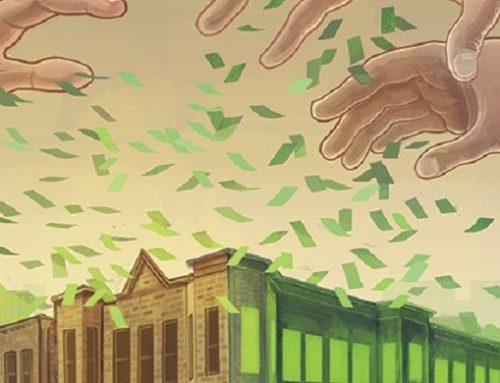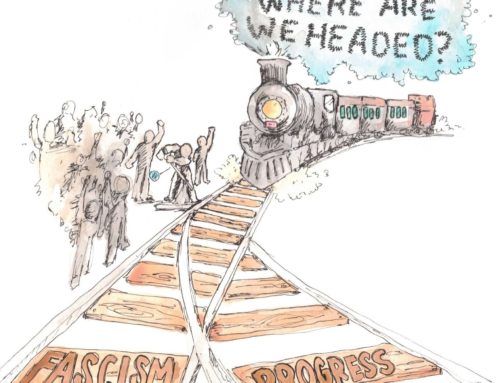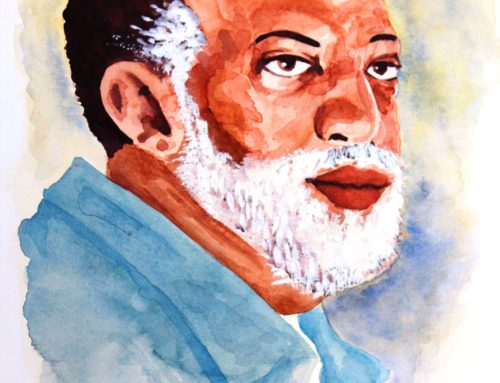An Interview with Mutombo Nkulu-N’Sengha
Mutombo Nkulu-N’Sengha is an Associate Professor at California State University, Northridge who joined the Religious Studies Department in 2003. Dr. Nkulu-N’Sengha teaches courses in African religions, Americans’ religious diversity, and comparative religion.
The interview was conducted by Marlon Stern (artist and activist in the Los Angeles area, who also transcribed the interview), and Stephanie McMillan (cartoonist/writer and organizer in South Florida).
SM: Tell me a little bit of the background on your projects in the Congo. Talk about the general conditions, the toxic waste dumping, mine conditions and worker conditions, how imperialism is affecting the country?
MN: Democratic Republic of Congo is a country in Central Africa with almost 70 million people now. DRC is very important and interesting to study in terms of the effects of globalization. This is not a poor country. There is no desert. There is no reason why people should be starving or waiting for rice to come from Europe. Congo, as you know, is well endowed in terms of natural resources, but it is one of the poorest countries in the world in terms of lifestyle of people. Congolese have a joke, they say, “We have become capitalists without capital, nationalists without a nation.” They put it this way, and sorry for this joke, “Our tragedy is to be rich,
Congo is like the most beautiful woman in the world, everyone wants to be friendly and come and have a piece of her.” That’s exactly what is happening with this country because there are so many minerals. It has been a battlefield. There is a proverb which says, “When two elephants fight, the grass suffers, when two elephants make love the grass suffers equally.” Peace between the US and Russia was not good; they pack their stuff and move out. They create a mess and then they say, “Hey, now you are free, now you can deal with your dictator.” Before, we support them because they say we are here to fight communism or we are here to fight capitalism.
Congo has a history of being a victim of globalization. One major step was the Renaissance, during the Renaissance you have slave trade, so Africa is brought into this global market, but the people don’t benefit, and of course you had a genocide during the time of King Leopold. That was a major genocide. The population of Congo was reduced by half. With the invention of the automobile, they need rubber for tires, so half of Congolese killed. Now in this age of digital technology we need computers and Congo happens to have 70 to 80 percent of the world’s reserve of coltan [short for columbite-tantalite, an ore used in electronics].
Because of that mineral Congo has become a battleground again, and we have lost more than 5 million. Some will say it’s a tribal war, but this has nothing to do with tribalism. This is a post-modern type of barbarism exported by those who are fighting for minerals. The war in the Congo “ended,” but never completely ended. There have always been these mineral conflicts. Diamonds, cobalt, gold.
Of course someone is selling weapons. Congolese don’t make weapons, so they are buying them and someone is selling them and benefitting from war. I always tell people those who sell weapons don’t like peace. They talk about peace: “blah blah blah.” The other aspect of this is people who are involved with mining industries are mining without any safety conditions. I heard, I haven’t read yet, there was a situation during the colonial time, the Shinkolobwe mining business of uranium. The mineral for the atomic bomb that was used on Hiroshima, Nagasaki, Japan came from Congo. It was sold by Belgium to the US. There are clear documents on that.
They made people carry the stuff on their head without any protection. It’s something we need now to really look into. If we have powerful international lawyers who have access to documents; it’s well documented. They worked people to death. The city is Legashi. Congolese minerals are not pure, they are often mixed. There is always small dose of radioactivity there, cobalt, uranium, etc. What we witness now is genetic mutation. Pollution has been so deep that it has reached the level that we are now giving birth to children without limbs without heads without mouth without legs. This is happening not just one case but in many cases in Lubumbashi.
I talked with the minister of health in Katanga who is a medical doctor. He clearly told me, listen, find your friends there, everyone knows what is happening, we simply do not have power. These people are so powerful, if you have a network, people who can lobby the UN, and not just talk about what to do with all these people who are sick, a way to force these multinationals to pay some money at least.
There is a river. We have Kafubu and Lubumbashi, the two rivers there. I do not know which one, but one is technically dead. It is full of chemicals. People don’t know. Down the stream people are still fetching that water and drinking it. They don’t know at all in villages. This is a serious issue, Chinese are involved and again they don’t’ care. It’s water mixed with acid. They do not follow any safety guidelines.
Globalization isn’t good for Congo. It is good for 0.001 percent of politicians. In the USA there is a law that you cannot bribe government officials to sign deals, but they do it all the time. Many people are coming from these mining companies. The Congolese politicians, they know how to play the game: “If you do not give us one million under the table, we give the contract to China or South Korea.” So they get paid. I was told, for all this mining stuff the country is getting barely three to five percent. Three to five, not even 20, not 15. Two percent is used to bribe government officials.
MS: Are there any big multinational corporations that are really entrenched over there?
MN: Oh yeah, I have a list in my office I could check. In fact we have a business ethics project we are working on; it’s not going to be efficient, but it is a way of doing something. If these people could abide by the rules and then create a coffer where we put money for social services, like for schools, hospitals and for cleaning, if people have been suffering from pollution. We can then say, these are the guidelines of the government, whoever wants a contract here must follow this. But we are still working on that. Now the US Department of Commerce is on board. Before we were going to have a meeting in Washington, but then the government was shut down, so the Congolese team did not come. Multinationals work in cahoots with politicians and members of parliament. The people are excluded. Politicians, they have money. Congo is full of money. They have hotels where one night people are spending 600 dollars a night. Not only Europeans, but Congolese as well.
They are making a tremendous amount of money. People become millionaires overnight. But people are extremely poor. What is the salary? Between 40 and 100 dollars a month. We are talking a man with a wife and seven or eight kids going to work from 7 am to 4 pm. This is a regular salary.
SM: Is it worse for miners? Is there a minimum wage law?
MN: They talk about it, but is not followed. In fact I heard people complaining that Chinese were not following it. They were lying when they hired people, saying they will give them like $500. But once you are inside, if you talk, you are kicked out. People are poor, unskilled workers, they play them like football. If you are fired, there are many hundreds who are willing to take the job. And people are not aware. Africa is not like Europe. Europe has a tradition of organizing against these things. In Africa people know, so they complain, but they cannot take a clear action. The only thing that has been working is striking. Since the time of the dictator, there have been people who strike.
SM: Are the strikes spontaneous; do workers build an organization first?
MN: There is an official organization, a union, but it is sometimes not efficient. It depends on the relationship between the multinational and the Governor and the President himself, because they can send soldiers to crush them easily.
SM: Are some of the union leaders also corrupt?
MN: Oh very often, yeah very often they work with the government. They bargain up to a certain point.
SM: So it is very difficult to organize?
MN: Well it can be done. There is hope because of youngsters, because of internet, they see all this happening around the globe and they do organize in terms of raising awareness.
When things bother the University, they know how to organize and challenge. The University director is often appointed by the President. The director of University in Congo is a government official. Lubumbashi has 30,000 students. When they do bad things, students can dissent in to the city and burn cars and stuff. The director there is really working with the government.
SM: What do you think about the potential for more international organizing, organizations spanning different countries to put pressure on some of these companies?
MN: I think that is badly needed. Youngsters now who do stuff on Facebook, they know, they need support from people who can talk about stuff in New York Times or maybe the UN. They have the idea, the connections. In the case of the Congo there is a limitation because of the language. If they work with Belgium, Belgium doesn’t really have any influence. France a little bit. It’s really an Anglo-Saxon world which is running the show. People do want to see something. Students, those who study political science, professors who teach political science, there are people who are radical. They bring things in to the classroom. As a result, Congolese are very suspicious of the UN and the US. They say all the wars we have in Congo are because America is making the war to control minerals. That’s what you hear from everyone.
MS: Do they say anything about China?
MN: They don’t see China in terms of political power; they see China making things that don’t last. They say if you buy something Chinese it is not going to last.
MS: Do the people get the connection between coltan and cell phones?
MN: Yeah that people know, especially students talk about it. There are programs that talk about it on TV. They know that this whole war, people make us work to take out minerals or impose the will of the President. It is complicated because you can have a good African president, and he is terrorized, and in the end he wants to save his skin so he signs deals. He knows in four years that he will not be in charge. That’s what happens with many ministers too. They told me that in the Ministry of the Environment you have inside the Ministry a German Office, a French Office and a US Office. Inside the building! So they run it. These Congolese are just there talking. They bring 200 trucks to go in the forest. The Minister has three; all the rest is run by these agencies.
SM: So basically they are there to prevent regulations from being enforced?
MN: They say they want to save the forest. But who is cutting big trees in the forest? Congolese don’t have machines. It is multinationals that are going in there to cut trees.
SM: So there is a strong sense, it sounds like, of an anti- imperialist sentiment?
MN: Oh yes, Congo because of the assassination of Lumumba has always been suspicious of the UN and the US itself, and what we call the Troika; the US, France and Belgium, because Belgium colonized us. People see that these three countries have always worked together. They worked together to eliminate Lumumba and impose Mobutu who was there for 32 years. People are suspicious. In fact they told the UN, what are you doing here? Go home. You see them everywhere in the Congo: UN soldiers. The conflict is in Kivu. Few are there, but they are running here and there. They are having a good time trafficking women and mineral. That’s what they do.
SM: Does the UN actually protect the mining concerns? In Haiti, the UN guards factories in the free trade zone.
MN: I do not see them doing that directly. If they hear there is going to be something, then yes. I know the US embassy is heavily guarded.
SM: Do you see the UN as a proxy for US, French and Belgian imperialism?
MN: Among the Congolese people, since the assassination of Lumumba, there is this suspicion. They say the UN, Europe and US are all the same. That’s the way they see it.
SM: What’s the potential, do you think for the anti-imperialist struggle? Kicking out the UN, kicking out the foreign companies and taking that land back?
MN: It’s not a matter of just struggling. Personally I’m kind of disappointed. I don’t understand why the Occupy movement has failed. You have brilliant minds in this country. These people were there in the crowd and making newspapers, reporting immediately. They have the technology. If they failed, then what is the likelihood of people in the Congo facing Coca-Cola or some other company?
The thing is this, when you had a tyrant—Russia, Belgium, France or somebody else—it was different. Now there is democracy. But what does democracy mean? For companies it is very good. They sponsor a guy, give him a helicopter and money. He can buy beer for people. This is what is happening, democracy bought easily. They decide who they are going to put in charge. People don’t have time to go check. They are poor. If you go to them, they say, “You come from America, you are rich, so get out of my face. Are you solving my problem? My child is sick and I don’t have food.” That’s the way it is.
Even someone who is lying to them, who will exploit them tomorrow even more, as long as they come along and give a little money, people follow. It’s not that I’m pessimistic; it’s a matter of preparing the ground for resistance. People have been talking about “globalization with a human face.” There is nothing with a human face there. It is a matter of mobilizing people. Internet is good, but internet can also domesticate the mind of the people. What do they show on the internet? All these little boys and girls have these Chinese cell phones.
They have all kinds of things, but what do they see? Any academic thing about revolution or change? Or do they see pornography? See that and go sleep. No revolution tomorrow. I say it’s a matter of being patient. Really patient. Let’s work grassroots. Let’s make things visible, show real issues. Explain to them how the machine works. You can’t see the machine if you don’t know how it works. You don’t see American perspective. It’s the Lebanese who are controlling things. The Lebanese control Congolese politicians. They control trade. Now you have Chinese, they are buying land for 50 years and 100 years.
Where I come from, they built a soccer stadium, and everyone helped, but they don’t know that land is going to be bought and they will not be allowed to grow food. But if you don’t see it, they think it is nonsense, they will not see it.
I showed a video on water because I created an English club and we are discussing things. My idea is if they know English they can have access to some ideas on the internet on the bad things too, at least to survive in this environment. They saw a video on Colorado River and the water war coming. They were touched, because Congo doesn’t have a desert. They were touched—they didn’t know there is not enough water in the world. They asked what can they do? I said, “Plant a tree.” I have faith in the youth, once you show them clearly.
SM: They have to understand how the system works.
MN: We want to create this journalist school for youngsters to start making videos. To document pollution and all these things. Make videos of the deformed children and make it visible. They did follow Occupy closely. They watched it on TV in Kinshasa and Lubumbashi.






That’s a great article. The Congo people are developing there lifestyle.